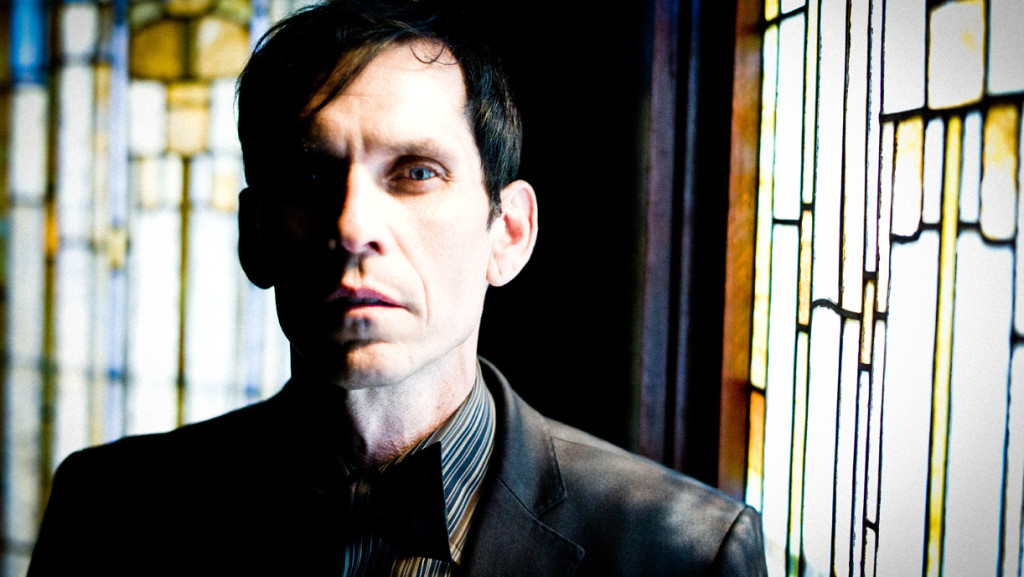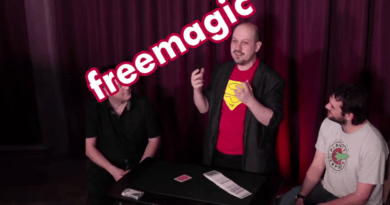An interview with Rob Zabrecky
In 1993 Rob Zabrecky was the 25 year-old frontman for Possum Dixon. On the best nights you’d find him with pantyhose on his head writhing on the sticky floors of LA stages. Possum Dixon sold 75,000 copies of hit single ‘Watch the Girl Destroy Me’ and toured around the world with The Lemonheads and Violent Femmes. But that was where it kind of peaked for the band. Their label Interscope refused to fund another single and by the late nineties they were lost, heroin-addled and over.
These days Rob is celebrated for helping turn magic into a multi-layered art form, infused with dark humour, character play and plot twists. David Elliot-Jones Skyped Rob ahead of his first visit to Australia for the Melbourne Magic Festival to try pry open his secrets.
Dave: So when you first took up magic how did your friends and the music community take it?
Rob: Well in general, the musicians thought I was totally nuts, they couldn’t understand why anyone in their right mind would become a magician because it wasn’t cool and many musicians are preoccupied with the idea of cool, you know. So that was weird. And my wife didn’t understand it, but she knew that it meant something to me. And now everybody’s kind of signed up for it. But originally I would say I got a lot of grief and a lot of slack for wanting to be a magician.
Dave: You proved them wrong.
Rob: Yeah sort of… most of them.
Dave: There’ve been quite a few moments in your career when you’ve been doing something amazing – something that’s been pretty close to you artistically – and then you’ve pulled the pin on it to start something new. How do you know when to do that?
Rob: (Laughs) There’s a burning desire from within that says “Stop! Run! Turn around! This chapter is over!” You know, I’ve always listened to my impulses.
Dave: Was there a specific moment when you turned to magic?
Rob: I think from the moment I stepped into The Magic Castle in 1996 or 97 with my girlfriend (who’s now my wife). The short answer is, walking into that club was a real eye-opener and I knew I wanted to be a magician.
Dave: So going in there you would’ve been surrounded by people who were pretty much at the top of their game in the magic world. How did you feel, and what did you want to do at that point?
Rob: Well I didn’t really know what I wanted to do, frankly but I saw some performers who were presenting character and theatricality in their work, and I immediately saw that magic, like music, like any art form, was a great mode of self-expression. I was drawn to it.
Dave: Your show has some pretty diverse aspects like tap dancing, and some pretty outlandish paper cutting… when you were starting out, what was your training regime like?
Rob: Well I’ll tell you what, it was intense because I realised I had a lot of catching up to do. I didn’t like magic as a kid, I liked music. And, you know, I was interested in Lou Reed and the Velvet Underground and the Warhol sixties, art and punk and things like that. So when most magicians were learning about card tricks and sleights and you know, parlour magic, I was reading the backs of record covers. So when I got into magic it was this whole thing about pedal to the metal, how much can I learn? How much can I absorb, and you know, sort of reinterpret my own way?
Dave: You must have been developing the theatrical side as much as the technical side from the early stages, you were getting a lot of attention for it from pretty well-known magicians. How did the wider magic community take that? Were there any doubters?
Rob: There are probably doubters, but I don’t know who they are and I don’t really subscribe to that. There were some doubters when I was at The Magic Castle. They didn’t like my style and thought it was too dark, and I’ve had some rejection letters to prove it. But once I started working in the parlour, in the show rooms at The Castle, I think people saw that what I was doing was new in a way.
Dave: Where do you go now that you’ve got pretty much the top award of magic [‘Stage Magician of the Year’ in 2012]. How do you carry on from that?
Rob: Well I can tell you this: all of my magic dreams have come true (laughs). They really have. And I carry on by reinventing myself and by seeking new material and finding new methods to present the tricks that are in my act, by finding comedic beats, by finding music that inspires me to move different ways and, you know, connecting with audiences and trying to find a sense of pathos and empathy in my new work, as well as trying to keep the old work fresh.
Rob-Zebrecky-1
Dave: Oddman [Zabrecky’s stage persona] comes across as a bit weird and creepy from the outset but from there we kind of end up liking him. Is there a message in there?
Rob: Absolutely there’s a message. The message is twofold: one, you might see people as being weird or bizarre but the more you get to look the interior, the more you might see that they’re more like you than they’re not. And the second thing is I’ve always tried to find ways of finding the beauty in the darkness, and that’s sort of the thesis statement from my one-person shows. I try to show this that through many things – by bringing out my diseased grandfather in the show, and by doing this and that and by the end I’m dancing away and everyone’s kind of rooting me on. So whenever I create new work I try to give it a sense of pathos and empathy because that’s what makes interesting storytelling. That’s what I wanna see when I go to the movies – I wanna find something about a character, a character or a song or a picture that I can sort of hang myself on. I think, “well it’s fine just to be weird but I can’t just be weird for weird’s sake because no one’s going to give a shit”.
Dave: Yeah sure. I think that’s what everyone wants out of a cultural product – to walk away, having gained something.
Rob: That’s so true. If you go to the most obscure punk rock or experimental artist, they’ll all say the same thing: that they’re making work for themselves but they’re putting work out there to make a connection. That’s the whole point. It feels great when that happens. You know I don’t always connect. Sometimes I don’t. There are nights when I walk off stage and think “oh my God that was crazy”. You know, it’s an ephemeral thing – audiences are different. I try to connect this idea but there are nights when I don’t and it can be an awkward mess.
Dave: Absolutely
Rob: Which is kind of fun too.
Dave: When you talk about the message in the music world compared to the magic world, is there anything that you miss? In terms of how that’s delivered?
Rob: Not at all. Because when I was playing music, first of all I was in my 20s and I was a different person, but the idea was, you have these little stories wrapped up in these three to five minute songs and you tell your story within that timeframe, and you put music to it and you frame it that way. I feel that in magic I’m the 47 year-old version of that person. Me telling these stories through magic pieces. It’s pretty fun to know that that’s an option.
Dave: Where would you be without magic?
Rob: It’s a good question. I really don’t know. I can’t say, I’ve never wondered about that. Because it’s always been there. From day one since it’s been there I’ve never imagined a life without it.
Dave: And just to wrap up here, what can we expect to see in your Melbourne show?
Rob: The Unexpected.
Dave: Haha… Alright Rob, thanks so much.
Keep reading on http://thethousands.com.au/melbourne/stray/an-interview-with-rob-zabrecky






Pingback: An interview with Rob Zabrecky | Auto Magic